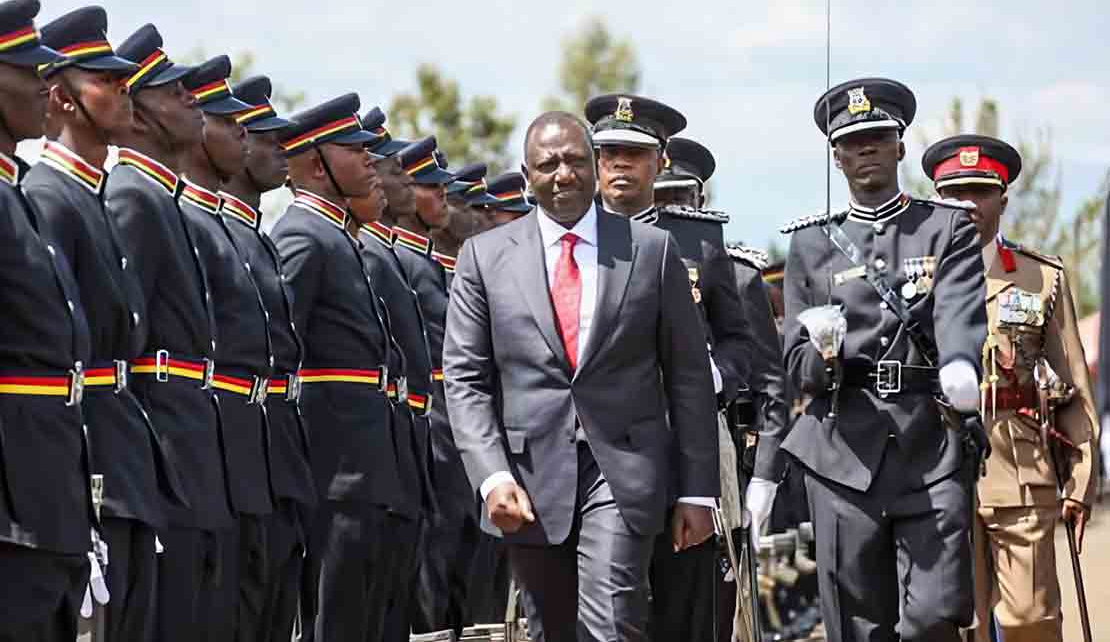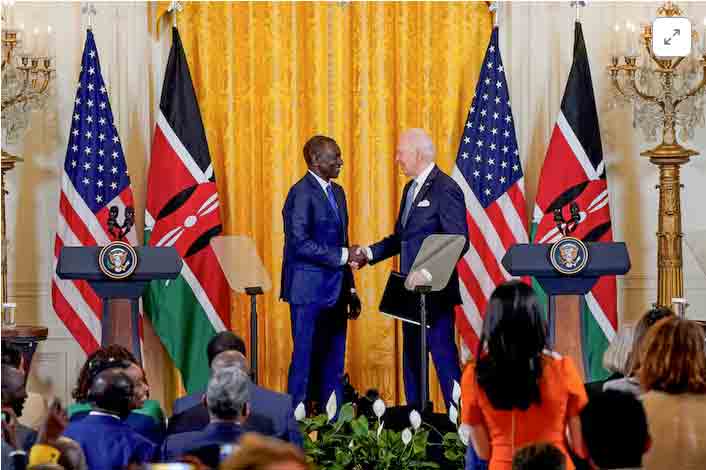HAITI | Kenyan Forces for Haiti Delayed again....To arrive in three weeks

MONTEGO BAY, May 25, 2024 -
After months of high anticipation, the deployment of an international force led by Kenya to violence-wracked Haiti has been delayed again. This has put paid to the high hopes of many Haitians that a vanguard of Kenyan police would arrive in that country this week.
Ruto has advised that the mission would be deployed to Haiti in 3 weeks to support the forces of Haitian police in their fight against armed gangs.
Ruto confirmed that a high-level planning team was already in Haiti and had met with police to make arrangements ahead of the deployment of Kenyan troops. "That will give us a frame of what things look like on the ground, the capabilities that are available, the infrastructure that has been set up [...]" he said that once everything is settled on the ground to start the mission, the Kenyan forces will be able to deploy
Ruto noted that in terms of American logistics, there was a lack of armored vehicles to move the troops due to a delay in deliveries. In addition, there was a lack of radios and communication equipment, weapons and other things that the mission needs from the start.
In addition, the mission must also have helicopters to evacuate potential wounded from the country, most hospitals being dysfunctional or closed in Haiti.
Finally, the buildings to house the Mission and its staff, according to information held by the President of Kenya, are still under construction by the United States and would be approximately 70% complete contrary to what had been claimed.
President Ruto's visit to the White House marks a pivotal moment in the evolving relationship between his country and the United States.
U.S. President Joe Biden welcomed the Kenyan President to the White House on Thursday for a state visit, pledging new partnerships on technology, security and debt relief to the leader of one of Africa's strongest democracies.

"My visit takes place at a time when democracy is perceived to be retreating worldwide," Ruto said, standing with Biden, Vice President Kamala Harris and other cabinet officials. Earlier, he had met privately with Biden in the Oval Office.
"We agreed on the significant opportunity for the U.S. to radically recalibrate its strategy and strengthen its support for Africa," Ruto said. Biden said he would designate Kenya as the first sub-Saharan African country to be a major non-NATO ally. Qatar, Israel and 16 other countries share that designation.
Successive U.S. governments have said they wanted to offer African countries a more sustainable and democratic alternative to relations with China and Russia, but Washington has failed to establish deep ties.
The continent's political landscape has been upended in the past year by a spate of military coups, wars and shaky elections that have given China and Russia greater influence. Biden hopes strengthening ties with Kenya, seen as a democratic stronghold, can help stabilize the continent and advance U.S. interests.
In a joint statement, the two leaders said they would work together to support the Somali government in its fight against terrorism and asked warring parties in Sudan to allow humanitarian access to aid and agree to a ceasefire.
During the Thursday press conference, journalist Ayub Abdikadir from Kenya’s Citizen TV questioned Ruto on the strategy of sending forces to a crisis in the distant Caribbean while security problems endure in Kenya’s North Rift region. “Why are you committing to Kenya when we have a problem back home?” he asked. Kenya’s responsibility is broader than its own borders, Ruto responded, underlining that troops and police had already been deployed to “sort out the banditry problem” in the North Rift.The UN Security Council last year authorized a multinational mission to support Haiti’s National Police in battling deadly gangs that have seized control of much of the capital Port-au-Prince.
Despite strong support from the US and other regional powers, however, the mission has been mired in uncertainty and legal challenges for months. It was further delayed following the resignation of former Haitian Prime Minister Ariel Henry in March, until the creation of a transitional governing council.
The council said Tuesday that it met with top Haitian police brass to discuss the multinational mission. “Haiti, through the Haitian National Police, will have overall control of all aspects of the field mission,” including the mission’s composition, aims, rules of engagement and health precautions, it emphasized in a statement on X.
Kenya is currently finalizing preparations for the mission, the country’s principal secretary of foreign affairs Korir Sing’Oei said Sunday, citing the successful creation of the council and other institutions in Haiti as key conditions.
“In view of that and in view of the decision of the courts in our republic essentially guiding how Kenya should be able to carry out this deployment, lots of reciprocal agreements were entered into between Kenya and Haiti, which facilitates Kenya’s ability to deploy. And we are in the process — our government is in the process of finalizing preparation to deploy.”
The mission is scheduled to launch by the end of this month. A UN-managed trust fund for the mission currently contains $21 million, provided by Canada ($8.7 million), France ($3.2 million), Spain ($3 million) and the United States ($6 million). Personnel for the mission have been offered by the Bahamas, Bangladesh, Barbados, Belize, Benin, Chad and Jamaica, in addition to Kenya.
US Secretary of State Antony Blinken on Tuesday defended US funding for the mission in a Senate Foreign Relations hearing, warning that Haiti is “on the precipice of becoming an all-out failed state” without international support.
“I understand some of the skepticism that exists about another mission in Haiti, but I think what we have going for us is this: first, a general revulsion of the people at the direction that the country has taken, including gangs that are dominating Port-au-Price and trying to undermine governance, a democratic trajectory that’s been disrupted by failing to have a government that actually has a clear mandate and all of that has also had the effect of interrupting development assistance, other forms of assistance that people so desperately need,” he said.
Haiti’s National Police have already “taken back control of the airport and other critical infrastructure,” he added. “In fact, today, commercial flights resumed in Haiti, and we anticipate that American carriers will begin flying again in the days ahead.”
-30-
